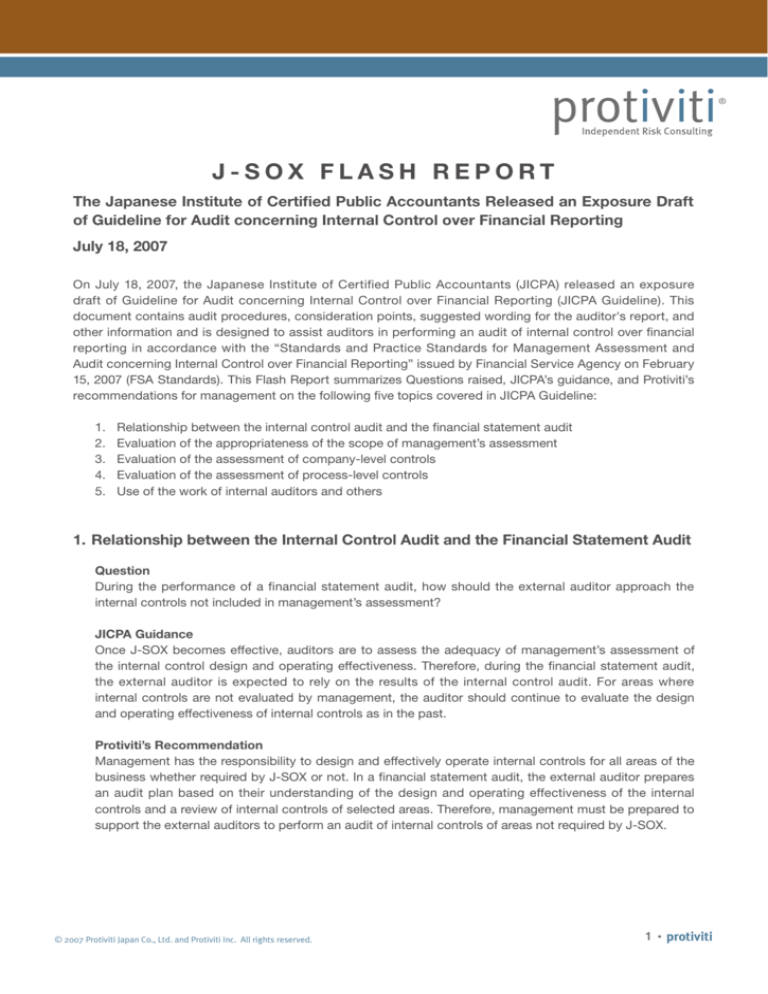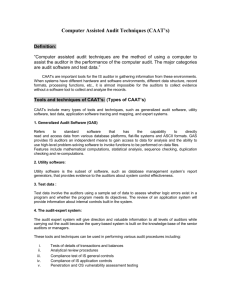
J-SOX FLASH REPORT
The Japanese Institute of Certified Public Accountants Released an Exposure Draft
of Guideline for Audit concerning Internal Control over Financial Reporting
July 18, 2007
On July 18, 2007, the Japanese Institute of Certified Public Accountants (JICPA) released an exposure
draft of Guideline for Audit concerning Internal Control over Financial Reporting (JICPA Guideline). This
document contains audit procedures, consideration points, suggested wording for the auditor's report, and
other information and is designed to assist auditors in performing an audit of internal control over financial
reporting in accordance with the “Standards and Practice Standards for Management Assessment and
Audit concerning Internal Control over Financial Reporting” issued by Financial Service Agency on February
15, 2007 (FSA Standards). This Flash Report summarizes Questions raised, JICPA’s guidance, and Protiviti’s
recommendations for management on the following five topics covered in JICPA Guideline:
1.
2.
3.
4.
5.
Relationship between the internal control audit and the financial statement audit
Evaluation of the appropriateness of the scope of management’s assessment
Evaluation of the assessment of company-level controls
Evaluation of the assessment of process-level controls
Use of the work of internal auditors and others
1. Relationship between the Internal Control Audit and the Financial Statement Audit
Question
During the performance of a financial statement audit, how should the external auditor approach the
internal controls not included in management’s assessment?
JICPA Guidance
Once J-SOX becomes effective, auditors are to assess the adequacy of management’s assessment of
the internal control design and operating effectiveness. Therefore, during the financial statement audit,
the external auditor is expected to rely on the results of the internal control audit. For areas where
internal controls are not evaluated by management, the auditor should continue to evaluate the design
and operating effectiveness of internal controls as in the past.
Protiviti’s Recommendation
Management has the responsibility to design and effectively operate internal controls for all areas of the
business whether required by J-SOX or not. In a financial statement audit, the external auditor prepares
an audit plan based on their understanding of the design and operating effectiveness of the internal
controls and a review of internal controls of selected areas. Therefore, management must be prepared to
support the external auditors to perform an audit of internal controls of areas not required by J-SOX.
© 2007 Protiviti Japan Co., Ltd. and Protiviti Inc. All rights reserved.
1 ・protiviti
2. Evaluation of the Appropriateness of Scope of Assessment
(1) Scoping of Company-Level Controls
Question
The FSA Standards requires management to assess company-level controls for all locations and
business units from a company-wide perspective except for locations and business units that do not
have a material effect on financial reporting. How should the external auditor determine “material effect”
in this case?
JICPA Guidance
The external auditor should use both qualitative and quantitative factors when determining materiality.
For quantitative factors, ratio of consolidated sales, consolidated total assets, and consolidated income
before taxes are included as examples. The external auditor should consider not only the degree of
influence of an individual entity to the consolidated entity but also the degree of influence of all excluded
entities to the consolidated entity.
Protiviti’s Recommendation
JICPA guideline does not include any example for qualitative factors. Factors Protiviti believes auditors
may use include: (1) whether additional business processes were added to the scope at the subject
entity, and (2) whether external auditor identified deficiencies in internal controls as a part of the financial
statement audit in the recent past.
(2) Scope of Process-Level Controls
Accounts that are closely associated with the company’s business
Question
The FSA standards list sales, accounts receivable, and inventory as accounts that are closely associated
with the company’s business for a generic company. How should the external auditors determine which
other accounts are closely associated with the company’s business?
JICPA Guidance
The guidance defines "Accounts closely associated with the company’s business” as accounts closely
reviewed by investors and other stakeholders when evaluating the operating results and financial
condition of the primary business of the company.
Protiviti’s Recommendation
If there are other accounts that investors and other stakeholders often review or utilize to analyze the
company or the industry, Protiviti recommends management evaluate whether such accounts should be
considered as accounts closely associated with the company’s business.
Significant business processes individually added to scope
Question
What should the external auditors consider when evaluating significant business processes individually
added to scope at an important business location and another business location, in relation to financial
© 2007 Protiviti Japan Co., Ltd. and Protiviti Inc. All rights reserved.
2 ・protiviti
statement audit?
JICPA Guidance
Business processes relating to accounts that contain risks which require special considerations should
generally be included in scope for evaluation of internal control by management.
Protiviti’s Recommendation
Significant financial reporting risks that require special audit consideration are treated as significant audit
items during a financial statement audit. If you observe the following symptoms, there is a high possibility
that the external auditors will consider these related accounts as significant audit items:
•
•
•
•
Significant effort spent during the financial statement audit
Regularly treated as audit issues
Consistently results in audit differences, or raised as issues at an audit closing meeting
Frequently commented by the external auditors during their visit to facilities and subsidiaries
If there are such accounts, Protiviti recommends management evaluate a possible inclusion of related
business processes to the scope and obtain external auditor’s advice.
3. Evaluation of the Assessment of Company-Level Controls
Question
Evaluations of company-level controls are often performed before the year-end. How should the external
auditor evaluate the effectiveness as of the year-end?
JICPA Guidance
When management operates a monitoring system that detects changes to internal controls in a timely
and appropriate manner, external auditors should evaluate the effectiveness of the monitoring system. If
an effective monitoring system has not been established, auditors should ask management to perform
roll forward procedures in order to evaluate the effectiveness of internal controls after the date of initial
evaluation. Then the external auditor should evaluate the results of these roll forward procedures.
Protiviti’s Recommendation
If the external auditor performs the audit of roll forward procedures at the year-end, it significantly
increases the effort of both auditors and management. In order to avoid this, Protiviti recommends
management establish and operate monitoring procedures of company-level controls.
4. Evaluation of the Assessment of Process-Level Controls
Question
Management is required to perform additional procedures when the evaluation of operating effectiveness
is performed before the year-end and when there is an important change to internal controls by the yearend. What should external auditors do when the audit of operating effectiveness is performed before the
year-end?
© 2007 Protiviti Japan Co., Ltd. and Protiviti Inc. All rights reserved.
3 ・protiviti
JICPA Guidance
When the audit of operating effectiveness is performed before the year-end, the external auditor should
evaluate whether the evaluation results is still valid at the year-end. The external auditor must consider
the needs for additional procedures based on the length of time between time the audit procedure is
performed and year-end, the nature of the audit evidence, and whether there is any change to internal
controls before the year-end.
Protiviti’s Recommendation
The external auditor is expected to perform an updated test in a similar manner management performs
an updated test. In order to reduce the amount of updated tests required and to reserve adequate time to
perform procedures possible only at the year-end, Protiviti suggests management discuss the following
points with the external auditor in advance:
•
•
•
Timing of interim test
Specifics of audit evidence obtained from the interim test
Procedures to determine the changes to internal controls
5. Use of Work of Internal Auditors and Others
Question
The external auditor may use the work performed by an internal auditor and others as audit evidence for
the management’s assessment provided they have evaluated the quality and effectiveness of the work. In
what cases, should an external auditor use the work of internal auditors and others as the audit evidence
of management’s assessment?
JICPA Guidance
First, an external auditor should evaluate the company’s internal audit function in accordance with Audit
Standards Committee Statement No. 15 “Understanding the Functions and Activities of Internal Auditing;
Using Internal Auditing for the Purposes of the External Audit”. In high risk areas, the use of the work of
an internal auditor must be evaluated carefully. In an audit of lower risk areas such as routine transactions
that occur daily, an auditor may utilize samples selected by internal auditors.
Protiviti’s Recommendation
The focus of internal audit is generally an operational audit, and the work that can be utilized for financial
statement audit is limited. At some companies, the external auditor and internal auditor may jointly
perform audit procedures such as account reconciliation and branch audit. Protiviti recommends that
management first obtain an understanding of the nature of internal audit and the external auditor’s use of
internal audits results for financial statement audit. If an external auditor is not using the results of internal
audit even if the result appears usable, management should confirm the reason with the external auditor.
Based on such review, management should review the nature of the internal audit, and it may become
necessary to change the nature of the internal audit to allow the external auditors to more effectively
utilize the results of internal audit. After such review and preparation, management should discuss the
potential use of the results of internal audits for the internal control audit.
© 2007 Protiviti Japan Co., Ltd. and Protiviti Inc. All rights reserved.
4 ・protiviti








